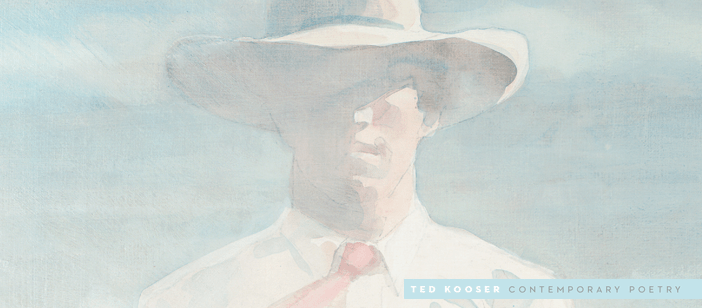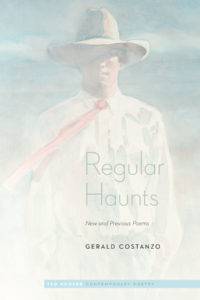From the Dietrich College of Humanities and Social Sciences at Carnegie Mellon University: Never one to shy away from using wit and satire to poetically describe American life, Carnegie Mellon University’s Gerald Costanzo deconstructs a fleeting, popular and consumer culture in his new book, Regular Haunts.
Published by the University of Nebraska Press and part of the Ted Kooser Contemporary Poetry series, Regular Haunts is a selection of Costanzo’s life’s work. It features nearly 30 new poems, half of which are introduced by epigraphs from mystery novels. The poems range in topic from life and in an exclusive arts and tourist community to a disliked boss who has fallen on hard times.
Fifty previous pieces from Costanzo’s more than four-decade career round out the book.
Called the “prophet of American consumer culture,” Costanzo, professor of English in the Dietrich College of Humanities and Social Sciences, writes in parables, fables and jokes—but with a serious undertone—of a culture where genuine emotion cannot be found yet its semblance can be endlessly marketed.
In the introduction, Kooser, who served as the poet laureate to the Library of Congress, recalled how he has never been satisfied reading one of Costanzo’s poems just once.
“There’s that delightful surface, sparkling with wit, with satire, with wordplay, and then there’s always that something else, that mystery maybe a fathom beneath the sun on the waves,” Kooser wrote.
Costanzo pushed himself out of his comfort zone in several of the new pieces. The CMU students he has taught poetry to since 1970 are sure to notice that in the title poem, “Regular Haunts,” rhymes.
“I disliked rhyming poetry but had assigned my students to rhyme over the years. I wondered if I could rhyme and maintain my tone,” Costanzo said.
Costanzo is the author of eight previous collections of poems and has edited six anthologies of poetry. He has received numerous writing awards and fellowships, including the Devins Award for Poetry, two Pushcart Prizes and two creative writing fellowships from the National Endowment for the Arts.
In 1972, Costanzo founded Carnegie Mellon University Press as a publisher of poetry. The press, which he still directs, has since evolved into a highly regarded publisher of poetry, classic contemporaries, short fiction and regional social history.
ARABESQUES AND BOTTLE BLONDES
The Scheherazades played bridge every
Thursday afternoon. Probably there were
reasons for this as the ladies in the group
might, on occasion, attest. The sea was there
before them, its meaning immeasurable.
After a twelfth trick, the one most beautiful
surprised by confessing there had been
no “relations” for six years. Some nervous
laughter, of course, and the one who was once
Miss Duluth was positive it wasn’t true
and could not resist saying so.
Still, the waves sparkled and beckoned;
the mojitos, served beside the potted bougainvillea,
had been a fine idea. And truly there is always
more than meets the eye when trump
is to be determined. Their evenings were cool
and those sunsets obvious as an ace of hearts.
This was the dream of gaming in sublime climate,
And Florida, they knew, is mostly weather.
MINNIE’S DEATH
Mickey is sitting on a stool in the Crow’s Nest, a bar in L.A.
He’s drinking a beer. He needs something stronger. He is
suicidal. He never married her and now she’s dead. He can’t
believe it. He’s reading her obituary in the Times: Minerva
Mouse (1928-2016), in Hollywood. Daughter of the late
Marcus Mouse and a late, unnamed mother. Loving aunt of
twin nieces Millie Mouse and Melody Mouse. She is survived
by her longtime significant other, Mickey Mouse, and her black-
and-white kitten, Figaro, whom she found abandoned on
Doheny Avenue. Mickey is beside himself. He asks the barkeep
For a yellow, No. 2 pencil. He is contemplating erasing
His wrists.
IN THE BLOOD
Vodka is the aunt of wine
—Russian proverb
Money is the rich
uncle of parliamentary
procedure. Impropriety
the handmaiden of desire.
Lust is a skeleton
in the closet of love,
and horsewhips are the fathers
of no questions asked.
The waddle is kin
to the walk. Virtue is that
wallflower of cousin of vice.
Charity is related to no one,
though the monocle
is half brother to the spectacles
and water is just the looser
sister of ice.
Excerpted from Regular Haunts by Gerald Costanzo. Copyright © 2018. Excerpted by permission of University of Nebraska Press. All rights reserved. No part of this excerpt may be reproduced or reprinted without permission in writing from the publisher.


























